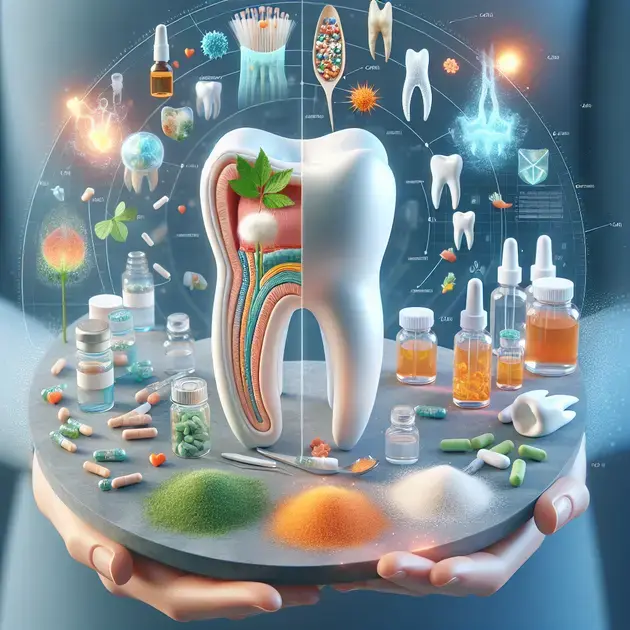When it comes to treating periodontitis, understanding medication options is essential for effectively managing this oral health condition. From antibiotics to antimicrobial mouth rinses, there are various medications available to combat the bacteria that cause gum disease.
Recent studies have shown that certain medications, such as locally administered antimicrobials, can provide targeted treatment for periodontitis with fewer systemic side effects. By delving into the different medication options and their specific benefits, individuals can work with their dental professionals to create personalized treatment plans that address their unique needs.

Understanding Different Medication Options for Periodontitis
When it comes to treating periodontitis, there are various medication options available. These options can include antibiotics, antiseptic mouthwashes, and prescription-strength toothpaste. One commonly prescribed antibiotic for periodontitis is doxycycline, which can help reduce inflammation and control bacterial growth in the gums. To obtain these medications, it is important to consult with a dentist or periodontist who can assess your specific case and prescribe the appropriate treatment. Additionally, online resources such as WebMD provide detailed information about medication options for periodontitis, including common side effects and recommended dosages.
For those looking for alternative medication options, herbal remedies such as tea tree oil and aloe vera have shown some promise in reducing gum inflammation and fighting bacteria. Websites like Healthline offer insights into the effectiveness of these natural remedies and how they can be used to support traditional periodontal treatments. It is essential to discuss any alternative medications with your healthcare provider to ensure they are safe and suitable for your individual condition.
Understanding the different medication options for periodontitis is crucial in managing this chronic condition effectively. By exploring traditional antibiotics, over-the-counter mouthwashes, and natural remedies, individuals can work with their healthcare providers to develop a comprehensive treatment plan tailored to their needs and preferences.
The Benefits of Locally Administered Antimicrobials
Locally administered antimicrobials are a targeted treatment option for gum disease that involves applying antimicrobial agents directly to the affected areas in the mouth. These antimicrobials can come in the form of gels, chips, or mouth rinses and are designed to combat the bacteria that cause periodontitis. One popular antimicrobial gel used in periodontal treatment is chlorhexidine, which is known for its effectiveness in reducing plaque and inflammation.
When using locally administered antimicrobials, it is essential to follow the instructions provided by your dentist or periodontist carefully. These instructions may include how often to apply the antimicrobial, how long to leave it in place, and any potential side effects to watch out for. Websites like Colgate provide step-by-step guides on how to use different types of locally administered antimicrobials correctly for optimal results.
The benefits of locally administered antimicrobials include targeted treatment of the infection, reduced systemic exposure to antibiotics, and improved gum health. By incorporating these antimicrobials into a personalized treatment plan, individuals with gum disease can enhance the effectiveness of their overall oral care regimen and promote long-term gum health.
Creating Personalized Treatment Plans for Gum Disease
Developing a personalized treatment plan for gum disease is essential for effectively managing this condition and preventing further complications. To create a personalized treatment plan, your dentist or periodontist will typically conduct a thorough examination of your mouth, which may include X-rays, measurements of gum pockets, and assessments of oral health habits. Based on this evaluation, a customized treatment approach will be designed to address your specific needs and concerns.
Online resources like Mayo Clinic offer insights into the different components that may be included in a personalized treatment plan for gum disease, such as professional cleanings, scaling and root planing, antibiotic therapy, and lifestyle modifications. Following the recommendations of your healthcare provider and maintaining good oral hygiene practices are crucial steps in managing gum disease effectively.
By collaborating with your dental care team and actively participating in your treatment plan, you can take proactive steps towards improving your gum health and preventing the progression of periodontitis. Regular follow-up appointments and adjustments to your treatment plan as needed will ensure that you are on the right path to achieving optimal oral health.

Understanding Different Medication Options for Gum Disease
Gum disease, also known as periodontal disease, is a common condition that affects the tissues and bone supporting the teeth. It can lead to symptoms such as swollen and bleeding gums, bad breath, and in severe cases, tooth loss. In addition to good oral hygiene practices, there are different medication options available to help manage gum disease. These medications can be used in conjunction with professional dental treatment to improve the health of your gums.
One of the medication options for gum disease is oral antibiotics. These medications can help eliminate the bacteria causing the infection and reduce inflammation in the gums. Antibiotics may be prescribed in pill form or as a mouth rinse, depending on the severity of the gum disease. It’s important to follow your dentist’s instructions carefully when taking oral antibiotics to ensure effective treatment.
Another option for treating gum disease is antimicrobial mouth rinses. These rinses contain ingredients that can help reduce plaque and prevent bacterial growth in the mouth. Antimicrobial mouth rinses are often used in combination with regular brushing and flossing to help control gum disease. Your dentist may recommend a specific antimicrobial mouth rinse based on your individual needs.
In more advanced cases of gum disease, your dentist may recommend locally administered antimicrobials. These are medications that are placed directly into the pockets of the gums where bacteria thrive. Locally administered antimicrobials can help reduce the bacterial load in the pockets and promote healing of the gum tissues. This targeted approach can be effective in managing gum disease and preventing further damage to the gums and bone.
Overall, understanding the different medication options for gum disease is essential for developing a comprehensive treatment plan. By working closely with your dentist and following their recommendations for medication use, you can improve the health of your gums and prevent the progression of gum disease.
The Benefits of Locally Administered Antimicrobials
Locally administered antimicrobials are a valuable treatment option for individuals with gum disease. These medications are applied directly to the affected areas in the gums, providing targeted treatment for bacterial infections. By delivering antimicrobials directly to the source of the infection, locally administered medications can effectively reduce the bacterial load and promote healing of the gum tissues.
One of the key benefits of locally administered antimicrobials is their ability to reach deep into the pockets of the gums where traditional oral antibiotics may not penetrate effectively. This targeted approach allows for a more concentrated dose of medication to be delivered to the infection site, increasing the likelihood of successful treatment. Additionally, locally administered antimicrobials have been shown to have fewer systemic side effects compared to oral antibiotics, making them a safer option for many patients.
Another advantage of locally administered antimicrobials is their convenience and ease of use. These medications can often be applied during a routine dental visit, reducing the need for additional appointments or complex treatment procedures. By incorporating locally administered antimicrobials into your periodontal treatment plan, you can effectively manage gum disease and improve the overall health of your gums.
Additionally, locally administered antimicrobials can be customized to meet the unique needs of each individual patient. Your dentist can determine the most appropriate antimicrobial agent and dosage based on the severity of your gum disease and your overall oral health. This personalized approach to treatment ensures that you receive the most effective care for your specific condition.
In conclusion, the benefits of locally administered antimicrobials make them a valuable option for treating gum disease. By utilizing these targeted medications, you can experience improved oral health outcomes and a reduction in the symptoms of gum disease. Consult with your dentist to learn more about how locally administered antimicrobials can benefit your periodontal health.
Conclusion
In conclusion, understanding the various medication options for gum disease is crucial for developing an effective treatment plan. From oral antibiotics to antimicrobial mouth rinses and locally administered antimicrobials, there are diverse ways to combat gum disease and improve oral health.
Oral antibiotics play a significant role in eliminating the bacteria causing infection and reducing inflammation in the gums. When prescribed correctly and used in conjunction with professional dental care, these medications can effectively manage gum disease, preventing further complications such as tooth loss.
Moreover, the benefits of locally administered antimicrobials cannot be overstated. These targeted medications provide a focused approach to treating gum disease by reaching deep into gum pockets where traditional antibiotics may not penetrate effectively. With fewer systemic side effects and the ability to be customized to individual needs, locally administered antimicrobials offer a safe and convenient solution for improving periodontal health.



